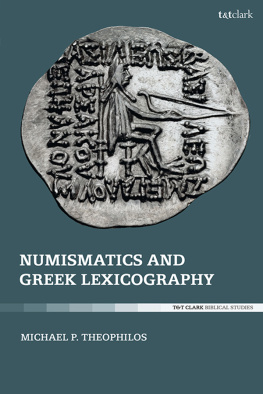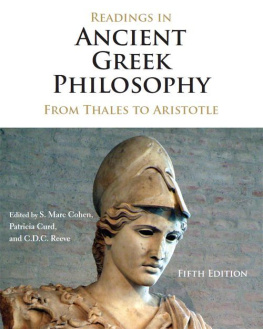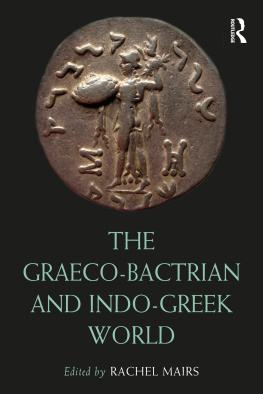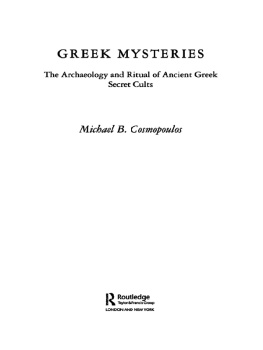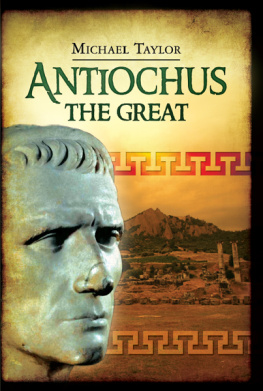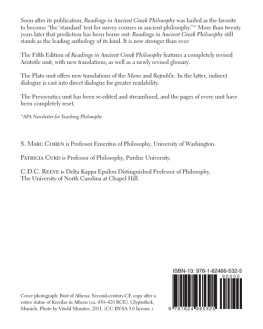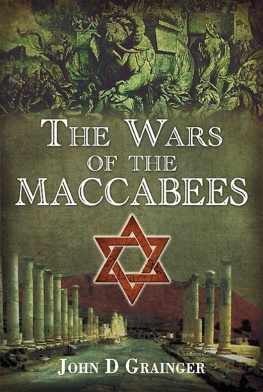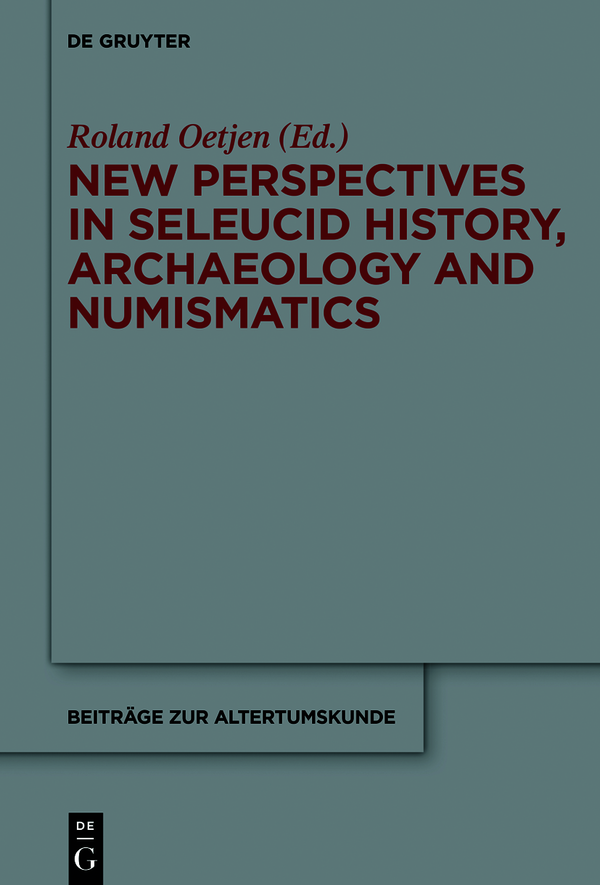New Perspectives in Seleucid History, Archaeology and Numismatics
Beitrge zur Altertumskunde
Edited by
Susanne Daub
Michael Erler
Dorothee Gall
Ludwig Koenen
Clemens Zintzen
Ernst Heitsch
Reinhold Merkelbach
Volume
New Perspectives in Seleucid History, Archaeology and Numismatics
Studies in Honor of Getzel M. Cohen
Edited by
Roland Oetjen
ISBN 9783110283785
e-ISBN (PDF) 9783110283846
e-ISBN (EPUB) 9783110388558
Bibliographic information published by the Deutsche Nationalbibliothek
The Deutsche Nationalbibliothek lists this publication in the Deutsche Nationalbibliografie; detailed bibliographic data are available on the Internet at http://dnb.dnb.de.
2020 Walter de Gruyter GmbH, Berlin/Boston
Preface
In 1978, Getzel published his first book entitled The Seleucid Colonies: Studies in Founding, Administration, and Organization. The book resulted from his doctoral dissertation, which he successfully submitted to Princeton in 1970. A German or European - or these days maybe even an American - ancient historian may not be aware that, when Getzel ventured out into the vastness of the Seleucid Empire, he was almost a revolutionary among the ancient historians of North America at that time. Their domain was the Athens of the fifth and fourth centuries. Even Getzels dissertation advisor, John Fine, ended his popular monograph The Ancient Greeks: A Critical History (1983) with the battle of Chaironeia in 338 BC. Having chosen the Seleucid colonies as the topic of his dissertation, Getzel not only needed to move from Greece to Asia Minor and from the Classical Greek period to the Hellenistic but also had to familiarize himself with types of evidence and traditions of research which, until then, had been foreign to American universities Classics departments.
The Seleucids would have been pleased to see their historian join the Classics faculty at Cincinnati in 1970. Getzel proved to be an ideal fit for that university. He taught ancient history to more than a generation of students. He served as the assistant director of the excavation at Kea from 1982 to 2005 and as the founding director of the excavation at Troy from 1988 to 2003. He hosted the AIA/APA annual meeting in Cincinnati in December 1983. He remained loyal to Cincinnati - because Cincinnati also proved to be ideal for him. The John Miller Burnam Classical Library allowed him to pursue his passion for all kinds of sources to his hearts content and enabled him to write his magnum opus, The Hellenistic Settlements, which was published in three volumes between 1995 and 2013. What appears, at first sight, to be a huge collection of individual studies of more than 515 Hellenistic settlements, reveals, upon closer inspection, a wide perspective.
A central problem in Greek and Roman history was how to exercise control over a large territory in a world in which the basic unit of political organization was, and continued to be, the city. Getzel addressed that issue - the governance of conquered lands - at precisely the moment at which it ceased to be local and became global. The comprehensive topography of the wider Greek presence went beyond the deadlocked discussions on the legal and political relationship between kings and cities and provided new insights into a subject which had already been dealt with extensively. As a result, Getzel became known as one of the worlds leading experts on Hellenistic history.
For all the effort Getzel put into his research, he was first and foremost a people person. Anyone who ever met him knows just how interested he was in people. He enjoyed meeting colleagues, presenting his work to them, and learning about theirs. Getzel appreciated how much his research had benefited from the unique resources offered by the John Miller Burnam Classical Library and decided to share them. In 2001, he created a visiting scholars program, which he named after Louise Tafts cousin, Margo Tytus. Under Getzels directorship, the Margo Tytus Visiting Scholars Program made it possible for almost 200 ancient historians and classicists to visit Cincinnati, make use of the library, and enjoy his hospitality and encouragement. Visiting scholars also had the pleasure of meeting his wife Sheila, a professor of dance, and also his companion and collaborator in many projects.
In autumn 2003 I was a fellow at the Center for Epigraphical and Paleographical Studies at the Ohio State University where I discovered a poster in the library, announcing fellowships for classicists at the University of Cincinnati. I saw that Getzel was the director of the program and realized that he was little more than 100 miles away. Since I was interested in the Hellenistic settlements and knew his books, I sent him an e-mail, the exact content of which I cannot recall. Although I was virtually a nobody at the time, having just completed my doctoral dissertation, Getzel called me, asking me to come to Cincinnati and meet with him. After I braved public transportation to get to Cincinnati and then to the university, he invited me to lunch in a nearby restaurant and, when we arrived, started one of the unconstrained conversations which, as I later found out, were characteristic of him. His interest in my current work and future career was vivid and genuine. When we had finished, he suggested that I take advantage of having traveled to Cincinnati by spending the afternoon working in the library and also offered to drive me to the bus station in time for me to catch my bus. At the agreed time, he picked me up from the library, as he had promised. When we reached his car, he admitted that he did not know where the bus station was but assured me that, if I missed the bus, he would drive me to Columbus. As we found the bus station quickly, I took the bus and did not avail myself of his generosity and helpfulness which I was to enjoy in the years to come.
Getzels primary concern was to produce good work and to help others to produce good work. Therefore, it seemed appropriate to present a Festschrift to Getzel on the occasion of his 70th birthday in 2012. Although he was pleased and supportive of the idea and of the authors proposed and delivered articles, a lack of secured financing, combined with the magnitude of the task, caused an unacceptably long delay in publication.I would like to express my gratitude to Lee Brice, Graeme Clarke, Arthur Keaveney, Jeffrey Lerner, Henry MacAdam, Gillian Ramsey, Francis X. Ryan, Rolf Strootman, and last but not least Lennard Appel for generously providing their help. When Getzel died in 2015 the Festschrift became a Gedenkschrift. The volume presented is now a collection of 45 articles on the history, archaeology, and numismatics of the Seleucids - the topic at the heart of his research. The authors originate from the US, Canada, France, the Netherlands, Germany, Denmark, Poland, Austria, Italy, Britain, Australia, New Zealand, Russia, Greece, and Israel. They are former Margo Tytus visiting scholars, long-standing friends, and colleagues who, although some never met him, want to pay tribute to an exceptional scholar.
Roland Oetjen
Bibliography of Getzel Cohen
1972
G.M. Cohen, The Hellenistic Military Colony: A Herodian Example, in: TransactAmPhilAss 103, 1972, 83-95.
1973
C.G. Boulter, D.W. Bradeen, A. Cameron, J.L. Caskey, A. J Christopherson, G.M. Cohen, and P. Topping (eds.),




